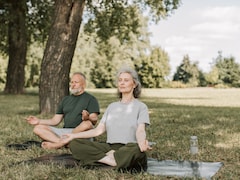Whether you're a seasoned runner or someone looking to explore brisk winter walks, these strategies ensure you stay on track with your goals while safeguarding your health.

Here Are 8 Tips For Exercising Outdoors During Winters
Exercising during winter can feel daunting, but it offers unique benefits, from refreshing air to improved mental health. However, cold weather presents challenges like lower motivation, risks of injuries, and dealing with frosty conditions. Staying consistent with outdoor exercise in winter requires thoughtful preparation and mindful strategies. Following simple tips can help you overcome these hurdles and continue enjoying your fitness journey safely and effectively. Whether you're a seasoned runner or someone looking to explore brisk winter walks, these strategies ensure you stay on track with your goals while safeguarding your health.
The benefits of outdoor winter workouts
Exercising outdoors in winter not only builds endurance but also supports mental well-being by reducing seasonal blues. Exposure to natural light boosts vitamin D levels, which often drop in colder months, aiding immune health. Cold weather can also enhance your body's calorie-burning capacity as it works harder to regulate its temperature.
8 tips for safe winter workouts
1. Dress in layers to stay warm yet flexible
Opt for moisture-wicking base layers to keep sweat away from your skin, followed by insulating layers like fleece, and windproof outerwear to protect against the cold. Layers can be adjusted as your body warms up, ensuring comfort and mobility.
2. Don't skip warm-ups and cool-downs
Cold muscles are more prone to injuries. Spend extra time warming up with dynamic stretches or light cardio before venturing out. Post-exercise cool-downs should include static stretching to ease muscle recovery and prevent stiffness.
3. Choose the right footwear for icy conditions
Wear shoes with good grip and insulation to prevent slips on snow or icy surfaces. Insoles designed for winter provide added warmth, while water-resistant shoes keep your feet dry and comfortable during your workout.
4. Stay hydrated even in cold weather
Dehydration is a hidden risk during winter as cold air reduces thirst perception. Carry a water bottle and take small sips regularly to maintain optimal hydration levels throughout your session.
5. Use reflective gear for visibility
With shorter days, visibility can be low during early morning or evening workouts. Wear reflective vests, armbands, or accessories to ensure you are visible to drivers and other pedestrians, especially in dimly lit areas.
6. Shield your extremities from frostbite
Protect hands, feet, and ears, which are more prone to frostbite, by wearing gloves, thermal socks, and a hat or headband. High-quality winter accessories keep these areas warm without restricting movement.
7. Adjust your intensity to match conditions
Cold air can make breathing harder, especially if you have pre-existing respiratory conditions. Opt for lower-intensity exercises on extremely cold days, or choose sheltered areas like parks with trees acting as windbreakers.
8. Monitor weather forecasts and air quality
Check for extreme weather warnings, including freezing temperatures, wind chills, or snowstorms. Avoid exercising during heavy pollution days, as cold air traps pollutants, affecting respiratory health.
9. Prioritise recovery with proper nutrition
Post-workout recovery is essential to combat winter fatigue. Consume warm, nutrient-dense foods rich in protein and healthy carbs, alongside hydration, to replenish energy levels and support muscle repair.
Outdoor exercise in winter can invigorate both your body and mind, but it demands extra care and preparation to ensure safety and effectiveness. By following these tips, you can embrace the unique benefits of winter workouts while minimising risks. Staying consistent during the colder months fosters resilience, builds discipline, and ensures you stay on track with your fitness goals year-round. The key is to balance your enthusiasm for fitness with mindful precautions, allowing you to make the most of the season.
Disclaimer: This content including advice provides generic information only. It is in no way a substitute for a qualified medical opinion. Always consult a specialist or your own doctor for more information. NDTV does not claim responsibility for this information.
DoctorNDTV is the one stop site for all your health needs providing the most credible health information, health news and tips with expert advice on healthy living, diet plans, informative videos etc. You can get the most relevant and accurate info you need about health problems like diabetes, cancer, pregnancy, HIV and AIDS, weight loss and many other lifestyle diseases. We have a panel of over 350 experts who help us develop content by giving their valuable inputs and bringing to us the latest in the world of healthcare.














